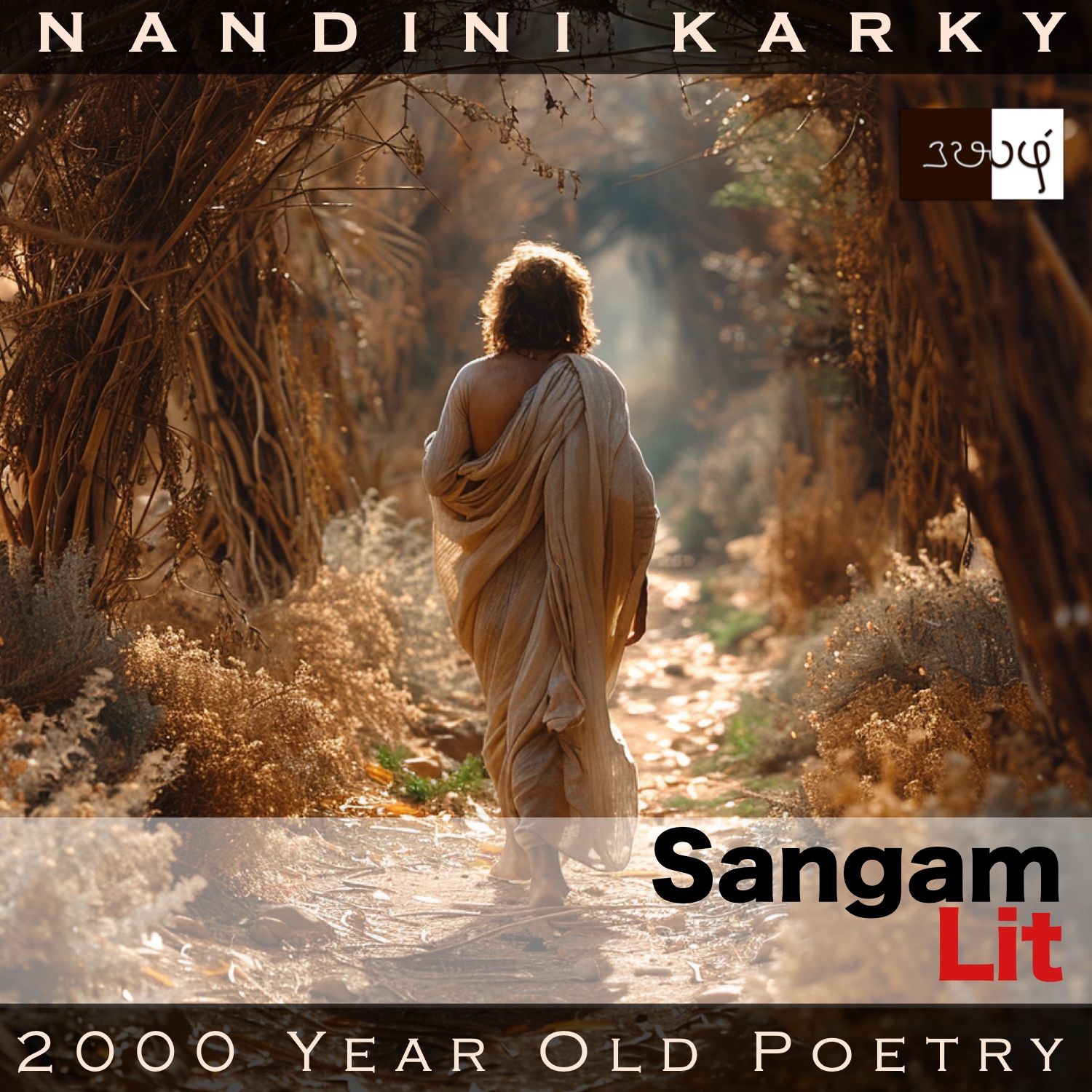Podcast: Play in new window | Download
Subscribe: Apple Podcasts | Spotify | Amazon Music | Android | iHeartRadio | TuneIn | RSS | More
In this episode, we listen to a supplicant’s difficult journey, as depicted in Sangam Literary work, Puranaanooru 370, penned for the Chozha King Cheruppaazhi Erintha Ilanchetchenni by the poet Oonpothi Pasunkudaiyaar. The verse is situated in the category of ‘Vaagai Thinai’ or ‘Victory’ and sketches the terrible state of a battlefield.

வள்ளியோர்க் காணா துய் திறன் உள்ளி,
நாரும் போழும் செய்து ஊண் பெறாஅது
பசி தினத் திரங்கிய இரு பேர் ஒக்கற்கு
ஆர் பதம் கண்ணென மாதிரம் துழைஇ,
வேர் உழந்து உலறி, மருங்கு செத்து ஒழிய வந்து,
அத்தக் குடிஞைத் துடி மருள் தீம் குரல்,
உழுஞ்சில் அம் கவட்டிடை இருந்த பருந்தின்
பெடை பயிர் குரலோடு, இசைக்கும் ஆங்கண்,
கழை காய்ந்து உலறிய வறம் கூர் நீள் இடை,
வரி மரல் திரங்கிய கானம் பிற்பட,
பழுமரம் உள்ளிய பறவை போல,
ஒண் படை மாரி வீழ் கனி பெய்தென,
துவைத்து எழு குருதி நிலமிசைப் பரப்ப,
விளைந்த செழுங் குரல் அரிந்து, கால் குவித்து,
படு பிணப் பல் போர்பு அழிய வாங்கி,
எருது களிறு ஆக, வாள் மடல் ஓச்சி,
அதரி திரித்த ஆள் உகு கடாவின்,
அகன் கண் தடாரி தெளிர்ப்ப ஒற்றி,
‘வெந் திறல் வியன் களம் பொலிக!’ என்று ஏத்தி,
இருப்பு முகம் செறித்த ஏந்து மருப்பின்
வரை மருள் முகவைக்கு வந்தனென், பெரும!
வடி நவில் எஃகம் பாய்ந்தென, கிடந்த
தொடியுடைத் தடக் கை ஓச்சி, வெருவார்
இனத் தடி விராய வரிக் குடர் அடைச்சி,
அழு குரல் பேய்மகள் அயர, கழுகொடு
செஞ் செவி எருவை திரிதரும்,
அஞ்சுவரு கிடக்கைய களம் கிழவோயே!
Another long song with elements of comparison between a battlefield and a crop-field. The poet’s words to this victorious Chozha King can be translated as follows:
“Being unable to find any generous patrons, thinking how to survive, collecting palmyra fibres and shoots, without getting any meat to eat, with a huge family that suffers in hunger, filled with the singular desire for good food, searching everywhere for a solution, with sweat pouring ceaselessly from the body, with an utterly ruined, shrivelled stomach, amidst the drylands where the sounds of owls resounds like the pleasant songs of the ‘thudi drum’, along with the song of the female kite that lives in the hollows of the lebbeck tree, through that long path filled with heat, where all the bamboos have dried up, leaving behind a forest where the striped hemp has lost all its moisture too, akin to a bird that seeks a tree filled with fruits, I came here.
Here, where shining weapons fall like rain and shower fruits, the flowing waves of blood spreads across the land, swords cutting down the flourishing crop ears and heaping the stems as many haystacks of corpses, with elephants as ploughing oxen, as raised swords seem like palmyra fronds that are used to thresh grain, scattering heads of many in that space.
Here I came playing on my wide-mouthed thadari drum, making its sounds resound, praising that this wide battlefield that you have claimed with your great strength be renowned. I came hoping for that mountain-like gift of an elephant with uplifted tusks adorned with iron ornaments, O lord. Indeed, I came with hope to this wide space, where as sharp-edged spears fall, raising their long arms, clad with armlets, lie the fearless warriors, with their legs tangled with intestines, as ghost maiden wail loudly and as eagles and red-eared vultures rove above – To this fearsome expanse of the battlefield that you are the conqueror of!”
Let’s delve into the essence of this verse. The poet spends a lot of time describing his situation and his journey. First, the absence of any benefactors who would resolve the hunger and want of this poet and his huge band of kith and kin is mentioned. He then talks about palm fibres and shoots, and perhaps, this is to comment on the only available food to the poet and his family. They are sorely missing the availability of meat and desiring this good food, the poet starts his journey. It’s no cake walk as he traverses the harsh drylands where the bamboos and hemp plants are all dried up, and so is he, as sweat pours out of his pores and his stomach is all shrivelled up, owing to the lack of food. He also brings in other sensory elements like that of the screeching of owls and kites that live in the hollows of dry trees in his path. The poet compares his journey to that of a bird which flies far in search of a tree filled with fruits.
After that vivid sketch of his present, the poet says how he finally came upon this battlefield, where he saw weapons raining down, while elephants ploughed like oxen and swords cut the crop ears of enemy soldiers, leaving behind haystacks of corpses. The poet mentions how he came playing on his thadari drum, and hoping for a particular gift of a hill-like male elephant with upraised and adorned tusks. Yet again, the poet turns to describe the way fearless soldiers are lying about, their arms raised and legs entangled with intestines, even as ghost maiden cry and flesh-eating vultures rove above. The poet concludes praising the Chozha king as the conqueror who has claimed victory on this hard-to-win battlefield and blesses the king’s fame to live for long.
Although the verse continues to highlight the gore of an ancient battlefield, in this verse, the focus is more on the impoverished state of an artist and his arduous journey through the drylands not to a palace but to a death-filled battlefield to seek patronage so as to alleviate his suffering. Through this song, we understand there was an ancient custom of bards and poets travelling to the heat of a battlefield, so as to sing about the winning king and earn their living.




Share your thoughts...